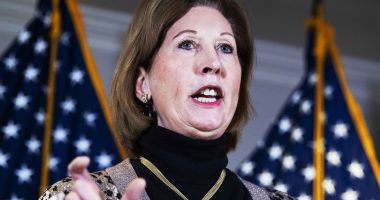The Omicron wave of coronavirus cases is weighing on the U.S. labor force, keeping millions of people home sick while others say they are working through illnesses.
This double impact from the biggest surge of Covid-19 illnesses so far in the pandemic comes as employers have struggled with an unusually tight labor market and an unemployment rate that is approaching pre-pandemic levels. Job openings have hovered at their highest-ever levels for months. Workers have quit at a record rate. Fewer people are in the workforce than before the pandemic began. Meanwhile, those who are working are getting bigger than usual pay increases amid the highest inflation in four decades.
SHARE YOUR THOUGHTS
How has the pandemic changed the way you approach sick days? Join the conversation below.
A U.S. Census Bureau survey conducted in early January said almost 8.8 million people were out of work because they were sick or caring for someone with symptoms of Covid-19. That is by far the highest such figure in the bureau’s “household pulse” survey since it began in mid-2020, exceeding the 6.6 million recorded in January 2021 and three million from December’s survey. The number of people reporting that they weren’t working due to concern about getting or spreading coronavirus rose to 3.2 million in the January survey from 2.6 million in December.
A separate survey by The Shift Project at Harvard University’s Kennedy School found that nearly two-thirds of workers who reported being sick in the last month during the survey period said they worked through the illness. The survey included 6,600 hourly workers who were polled from September to November. People cited financial reasons as the top reason they worked while sick, followed by not wanting to let down co-workers and fear of reprisals.
Economists say both high levels of absenteeism and people working while sick during the pandemic could affect the economy in the near term.
Paul Ashworth, an economist at Capital Economics, said he expects the trends to lower U.S. payrolls in January before reversing in February. “All we can say is it will probably be pretty temporary because infection numbers are coming down” in places such as New York and Washington, D.C., he said.
Ill workers who don’t have sick leave must decide whether to work and get paid or stay home and reduce the risk of getting others sick. Employees at short-staffed businesses are under pressure, both financially and from co-workers and managers, to carry on working even when sick, economists say. Moreover, absenteeism on production lines and in restaurants risks further disrupting the economy.
“Workers rely on [scheduling] managers for shifts and hours,” said Daniel Schneider, professor of public policy and sociology at Harvard University and co-director of The Shift Project. “There is this real fear of doing things that antagonize that person or make their life harder—calling out [sick] does not help.”
The Shift Project survey also found that the fear of getting sick from Covid-19 was helping drive a wave of early retirements during the pandemic, with 33% of people retiring early saying the risk of getting sick during the pandemic was too high.
Kathryn A. Edwards, an economist at Rand Corp., said that for many workers the decision to stay home either while sick or caring for a child is a mix of preference and limited access to sick leave in some parts of the labor force.
“We have an informal system of guilt and fear of repercussions keeping people in jobs because we don’t have access to paid sick leave for one in four private-sector workers,” she said.
About three-quarters of private-sector workers get some form of paid sick leave, according to the Labor Department, a share that has risen slightly since before the pandemic. But in the services sector, which includes restaurants and retail positions where in-person contact is high, more than 40% of workers have no paid sick leave, a share that has barely changed since 2019, according to the Labor Department.

Courtney DeCosta didn’t get paid while in quarantine from her job at a medical-records management company in December.
Photo: Courtney DeCosta
Courtney DeCosta of Manchester, N.H., said she didn’t get paid while in quarantine from her job at a medical-records management company in December due to a Covid-19 infection.
“Right before Christmas, losing that money, it was very tempting” to go into work sick, Ms. DeCosta said. But she said she was really sick and stayed at home to isolate, adding, “I think if it had been asymptomatic it would have been more tempting.”
That was the second time the 33-year-old project manager had isolated herself during the pandemic. The first was last March because she was in close contact with an infected person. She said she received pay in March because a now-expired pandemic-related benefit supplemented her income. By December, she had used her three paid sick days for the year and lost about a quarter of her income for the month.
“Certainly not paying people is absolutely going to be encouraging people to go to work sick and that’s clearly bad; that’s how we had the spread in the first place,” she said, referring to Covid-19 illnesses in her workplace.
Write to Harriet Torry at [email protected]
Copyright ©2022 Dow Jones & Company, Inc. All Rights Reserved. 87990cbe856818d5eddac44c7b1cdeb8
This post first appeared on wsj.com







